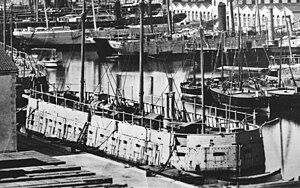 Lave, one of the first ironclad floating batteries.
| |
| History | |
|---|---|
| Namesake | Lava |
| Ordered | July 1854 |
| Builder | Lorient, France |
| Cost | 1.23 million French Francs |
| Laid down | 20 August 1854 |
| Launched | 5 June 1855 |
| Decommissioned | 1871 |
| Maiden voyage | 6 August 1855 |
| Fate | Scrapped in 1873[1] |
| General characteristics | |
| Class and type | Dévastation-class ironclad floating battery |
| Displacement | 574 tonnes |
| Length | 53.02 m (174.0 ft) |
| Beam | 13.35 m (43.8 ft) |
| Draught | 2.66 m (8 ft 9 in) |
| Propulsion |
|
| Speed | 4 knots (7.4 km/h; 4.6 mph) |
| Armament |
|
| Armour | 110mm iron plates (100mm over the batteries), plus 440mm oak planking. |
Lave was an ironclad floating battery of the French Navy during the 19th century. She was part of the Dévastation class of floating batteries.
In the 1850s, the British and French navies deployed iron-armoured floating batteries as a supplement to the wooden steam battlefleet in the Crimean War. The role of the battery was to assist unarmoured mortar and gunboats bombarding shore fortifications. The French used three of their ironclad batteries (Lave, Tonnante, and Dévastation) in 1855 against the defences at the Battle of Kinburn (1855) on the Black Sea, where they were effective against Russian shore defences. They would later be used again during the Italian war in the Adriatic in 1859.[1]

The ships were flat-bottomed, and commonly nicknamed "soapboxes". They were towed from France to Crimea to participate in the conflict. Lave was towed by the paddle frigate Magellan.
- ^ a b (in French) Classe Dévastation Archived 2007-09-05 at the Wayback Machine in Dossiers Marine